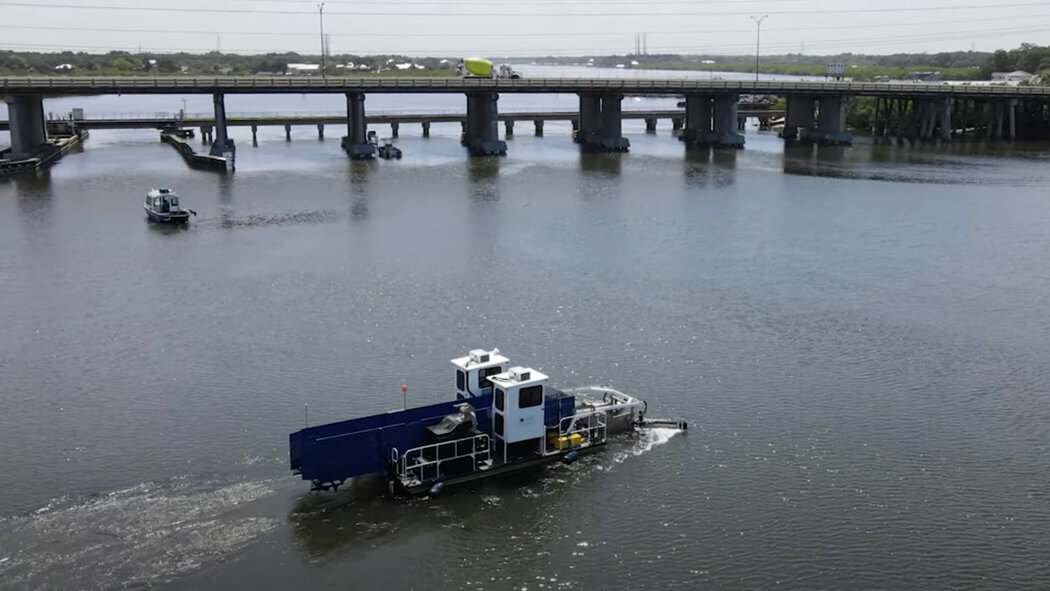Cities are turning to “trash skimmers” to rid their waterways of plastic waste. But environmentalists say the boats are more of a Band-Aid than a solution.

As plastics accumulate in rivers and bays, localities across the country are seeking creative, affordable solutions to keep their waterways clean. Many have turned to “trash skimmers,” boats that are designed to remove litter.
Tampa, Fla., is one of the latest cities to invest in such a vessel, a $565,000 boat that it has named the “Litter Skimmer.” It skims single-use plastics and other trash — as well as organic materials such as branches and leaves — from the water and onto a conveyor belt that pulls it into a storage area, a city spokesman said.
The boat debuted about a year ago and has since gathered about 13 tons of debris, said Alexis Black, an environmental specialist with Tampa’s Department of Solid Waste and Environmental Program Management.
As far back as the 1950s, scientists have been warning that marine life was getting stuck in discarded fishing gear and other types of plastic waste. Since then, consumption of single-use plastics has risen to the point where tens of millions of tons of plastic enter Earth’s oceans each year. Over the years, plastics have harmed local ecosystems and disrupted storm water management, leading to flooding.
The skimmer is only one method that Tampa is using to remove waste from its local waters. The city also organizes community cleanup events along its waterways and in its parks, and uses tools like baffle boxes and netting to keep debris from leaving storm drains and going into the river.
“The introduction of Litter Skimmer was just to add an extra layer of the strategy to combat the litter that makes it into the water bodies,” Ms. Black said. “It’s a great step to capture a lot of the waste that in the past was just left to float down the river in the bay and beyond.”
Trash skimmers have long been part of municipal efforts to clean up waterways. Washington, D.C., began using skimmer boats in 1992 and added two more to its fleet in 2017, for $484,000 each. The Passaic Valley Sewerage Commission in New Jersey unveiled its first trash-collecting vessel in 1998 and purchased a second in 2018 for about $653,000.
D.C. Water, Washington’s water utility, said that its boats collect 300 to 500 tons of waste each year. The Passaic Valley Sewerage Commission said its boats gather 160 tons of waste annually.
Carroll Muffett, president of the Center for International Environment Law, a nonprofit that focuses on environmental issues, said the skimmer boat programs are well-intentioned, but such efforts do little to address the overall problem of plastic pollution.
While skimmers are designed to collect larger pieces of floating trash, many plastics are too small for the vessels to capture, Mr. Muffett said. A 2019 study from the University of South Florida St. Petersburg and Eckerd College estimated that four billion particles of microplastics — which are less than one-eighth of an inch long — are in the Tampa Bay.
Most municipal skimmers also have limited hours of operation, Mr. Muffett said. The skimmer in Tampa, for instance, runs 10 hours a day, four days a week, typically operated by two people.
“You begin to understand that this is only a tiny Band-Aid on what is a massive problem,” he said. “What it also represents is the massive investment that cities, counties and states are making in cleaning up this problem.”
There isn’t just a policy responsibility; it’s a personal one as well, said John Atkinson, an associate professor of civil, structural and environmental engineering at the University at Buffalo.
“We’re a culture that is reliant on plastic,” Professor Atkinson said, adding that “choosing to use a reusable water bottle, while small, can be substantial if everybody chooses it.”
Policies that reduce the overall use of plastic, such as bans on single-use disposable plastics, would be more effective, he said.
“We cannot scoop, we cannot shovel, we cannot net, we cannot recycle our way out of the plastics crisis,” Mr. Muffett said. “The only way we address the plastics crisis is by producing — and using and losing — fewer plastics.”
